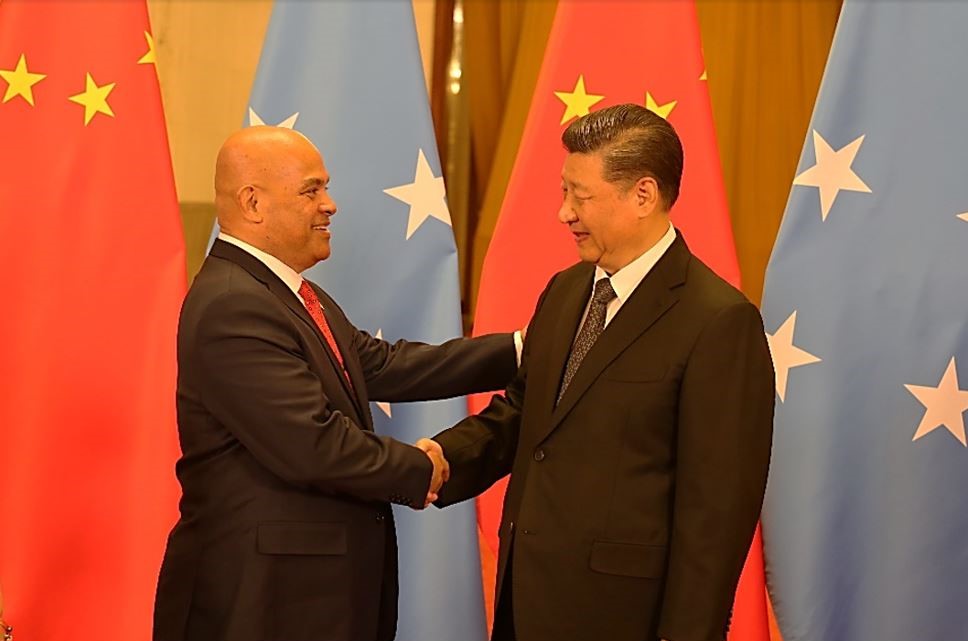A few days before he left office in May, former Micronesian president David Panuelo unleashed his displeasure with China, divulging a list of the communist nation’s political transgressions including political warfare and bribery.
However, Panuelo’s attempt to sever ties with Beijing was defeated by the FSM Congress’ rejection of his proposal to switch ties to Taiwan.
Panuelo’s successor, Wesley Simina, rescued the Federated States of Micronesia’s diplomacy with China, a predictable move given that the new president was the speaker of the Congress that said no to diplomatic shift.
The FSM “attaches great importance to developing a friendly relationship with China and will further promote in-depth relations between the two countries,” Simina said in his remarks on June 26 when Wu Wei, the new Chinese ambassador to the FSM, presented the letter of credence.
Wu said Chinese President Xi Jinping hopes “for strengthening and advancing relations” between China and the FSM.
Welcoming the Chinese ambassador, Simina said the accreditation “is even more timely, and signifies the opening of a new chapter in the 34-year history of FSM-China bilateral relations.”
Reiterating the FSM’s One-China policy, Simina thanked Beijing for its “contribution to the development of the FSM,” and vowed to “further enhance pragmatic cooperation with China in a bid to deepen bilateral relations.”
After the brief ceremony, Simina and Wu engaged in a private discussion on a range of topics including ongoing projects in the FSM, such as the air service agreement and medical referral agreements between the two nations, according to the Office of the FSM President.
China and the FSM established their diplomatic relations on 11 September 1989. The Pacific island nation has been a recipient of Beijing’s Belt-and-Road initiative.
In recent years, however, the United States began crawling back into the Pacific region after long years of neglect, realising it was on the verge of losing the continent’s favour to China.
While the FSM is affiliated with the U.S by virtue of the Compact of Free Association, Washington recognised it as a fragile spot. When he was in office, Panuelo tried to strike a diplomatic balance, referring to China as “a great friend,” and the U.S an “enduring partner.” In the twilight of his term, Panuelo finally picked a side. In the end, his attempt to dump China was shielded by an entrenched relationship between the two nations.
On 18 May, Xi Jinping sent a congratulatory message to Simina on his inauguration as president of FSM. The Chinese leader said he stood “ready to join hands” with Simina “to support each other on issues concerning each other’s core interests, deepen exchanges and cooperation across the board, and promote the continuous development of the China-FSM comprehensive strategic partnership.”
It is not currently known if China’s “research vessel” KeXue has returned to the FSM. Before the end of his term, Panuelo called a moratorium on the vessel’s activity after learning that the ship was using the nation’s waters to conduct espionage on U.S security installations and assets as part of Beijing’s “political warfare” in the region.
The FSM’s renewed relations with Beijing keep Washington on its toes. While China has a foot in the door, the FSM— specifically Yap— is one of the U.S military’s divert operation sites in the Pacific region in case its Guam posts are incapacitated during a conflict. This agreement is embedded in the compact.
On 23 May, the U.S and the FSM signed three compact-linked agreements that will renew the expiring economic provisions under the treaty. If approved by Congress, the FSM would receive US$3.3 billion out of the US$7 billion appropriation for freely associated states over 20 years.
Edged in between two superpowers, the FSM knows how to maintain the balancing act.
“Today is cause for celebration in the life of our young country,” Simina said during the signing ceremony. “These agreements continue a renewal and extension of our enduring partnership with the United States that began after World War II. They constitute a reciprocal commitment between our two governments to continue and deepen that partnership for years to come.”
“This is indeed a historic day. It is a day that symbolises, with substance, the desire, intent, and willingness to renew our agreement, and to continue to deepen and strengthen our enduring and historical special relationship with the United States,” said Leo Falcam, FSM’s chief negotiator.
He said the agreement “respects each nation’s sovereignty and recognises how far the FSM has progressed in our ever-increasing ability to effectively administer and manage the economic and financial affairs of this nation.”
“It represents our enduring FSM desire for continued economic growth and development and our mutual and bilateral desires for a stable, secure, and prosperous rules-based Pacific,” he added.
Alissa M. Bibb, chargé d’affaires of the U.S. Embassy in Kolonia, said the U.S and the FSM “shared respect for democracy, commitment to human rights, the rule of law, and shared desire for the peace and security of the region.”
“We truly appreciate our deep and enduring partnership with the FSM, exemplified by the COFA,” she added.
SOURCE: PACIFIC ISLAND TIMES/PACNEWS














